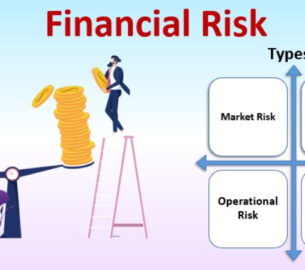Financing is the most significant risk in small business operations. The majority of small-time business owners who use debt financing to finance their businesses run the Risk in Finance to lose significant capital. It is a risk for the entire company. There is a possibility that investment in other companies could lead to financial risk.
What Is Financial Risk?:
Financial risk is part of investing in companies, individuals, governments, financial markets, and other entities. Financial risk is generally defined as the possibility that a company will not fulfil its debt repayment obligations. As a result, potential investors’ money may be lost. The greater the company’s debt, the higher its financial risk.
What Causes Financial Risk?:
These are the three biggest sources of financial risk:
- An organisation’s vulnerability to fluctuations in market prices can lead to financial risks, including currency exchange rates and commodity prices.
- Transactions in derivatives with companies other than suppliers, customers and counterparts can pose a financial risk.
- Financial expansion due to the failures or internal functions of an organisation, especially as they relate people, processes and systems
There Are Many Forms Of Financial Risk:
Credit Risk:
Any organisation that owes money (such as a bank, lender or another party) to a creditor or another party is subject to credit risk (such as a supplier). You may be exposed to credit risk if you provide credit to customers because of the possibility that they will not pay.
Liquidity risk:
This is when the parties cannot close the transaction because of any failure by another business. Two types of liquidity risks could exist in a business: Asset Liquidity Risk or Funding Liquidity Risk. Asset liquidity is when there are not enough buyers or sellers to fulfil counter orders. Fund liquidity is when there are insufficient funds within an organisation.
Equity Risk:
This is the third type of financial danger. It involves an investor’s stock. It is difficult for companies to price stock shares in volatile markets. The market value of any company can often fall, which is not good news in the long term. This volatility in equity stock markets is what is called equity risk and is linked to an organisation’s financial risk.
Operational Risk:
Operational risks are a general term that can be used to describe any risk your company may face in its daily operations. If your company is not prepared for and manages these issues, such as employee turnover, fraud, theft, fraud, lawsuits, and bad budgeting, it could threaten its bottom line.
Market Risk:
As the name suggests, this is the risk that your business faces due to the market in which it operates. Market volatility, raw material costs increases, foreign exchange rate changes, or market volatility are all factors that can lead to losses.
Legal Risk:
This type of financial risk is only caused by legal proceedings such as litigation. Legal risk is the possibility of financial losses for a company as a result of legal proceedings.
Political Risk:
These are risks that arise from unpredicted political conditions or new legislation that could impact a company or sector. These risks include those that can arise from poverty, terrorism and severe economic downturns.












